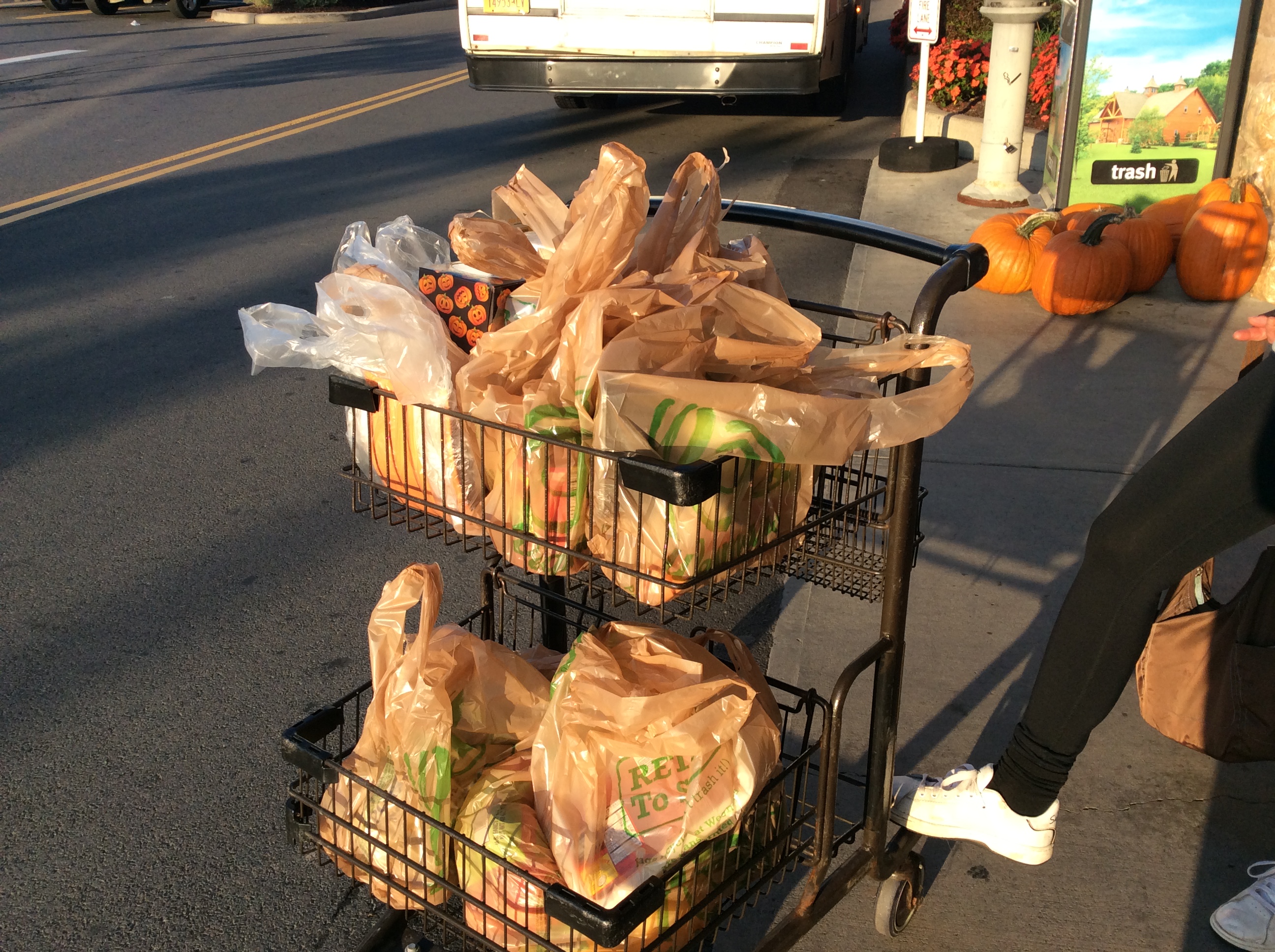
A Wegmans customer brings groceries in plastic bags to her car. A single-use plastic bag is used for an average of 12 minutes before being disposed. (Photo by Allison Falk)
When one imagines the life of a plastic bag, a single bag strewn on the side of the road might come to mind. However, plastic is so deeply ingrained in our environment that it is able to pass through wastewater plants and make its way into products such as facial cleansers.
Even some plastic bags that are advertised as biodegradable, breakdown into small pieces called microplastics, until they are consumed by the lowest animal on the food chain: plankton.
Amanda Champion, a Tompkins County legislator and member of the Waste Reduction Committee, a subcommittee of the Environmental Management Council (EMC) that serves as a volunteer advisory board to the County Legislature, has been fighting to pass a ban on single-use plastic bags since the State Senate rejected a statewide proposal a year ago.

Amanda Champion, Tompkins County Legislator, 12th District (Courtesy of Champion’s Facebook Page)
The proposed plastic bag ban — currently being discussed in the Legislature’s Planning, Development and Environmental Quality Committee — will be voted on in early November. The EMC reports to the committee comprised of five legislators, including Champion. If it’s approved by the committee, which is expected, the proposal will be brought to the full legislature. At least eight out of fourteen legislators must vote in favor of the plastic bag ban, in order for it to become a law throughout the county.
“Once it passes, which I’m fairly sure it will, there will be a long implementation time, six-to-eight months to educate the public and reach out to retailers to make plans for their future,” said Champion.
The Waste Reduction Committee has used momentum from a recent ban passed in Ulster County, NY, to fuel its cause, hoping to appeal to the local government.
During public meetings on the issue, concerns about the policy’s negative effects have been brought to the forefront.
“One of the big concerns is how will this affect low-income people and people who can’t afford to buy reusable bags or can’t afford to pay a fee for a [paper]bag,” said Champion. “Often times elderly folks will put one or two small items in a plastic bag and they can easily carry those. The question is, can they adapt to this.”
Two Ithaca College students who are members of the Waste Reduction Committee, Anna Bornstein and Sophie Becraft, have been talking with local businesses owners about their views of the potential ban.
“This is exactly the sort of stuff I want to do after I get out of college,” Bornstein said. “It’s really good to get some real world experience and actually see how even though it’s small town change, it’s a small start to a much bigger movement.”
Brandon Kane, manager of GreenStar Co-op in Ithaca, said the model of a plastic-less grocery store could be adopted but would need support from management and employees. GreenStar no longer uses single-use plastic bags.
“We experimented first in 2009 with a biodegradable plastic bag, whatever that means, they’re still plastic and don’t really breakdown,” Kane said. “The only challenge was that it didn’t create a cascading effect of other people trying to mimic it.”
After testing out the biodegradable plastic bags, GreenStar management decided to switch to paper bags.
If the proposal passes the county legislature, the use of paper bags, which are more expensive than plastic ones, would be required. That’s a concern of some business owners. To offset the costs, stores would charge 10-cents per bag.
Kane, who helped implement a plastic ban at GreenStar in 2010, noted no significant financial impact in the transition from plastic to paper.
“We haven’t found that our expenses increased whatsoever with banning plastic bags,” said Kane.
If the proposed plastic bag ban is approved by the legislature, residents would see the GreenStar model in effect at all Tompkins County businesses by the end of 2019.
(Correction: The committee names were reported incorrectly in the original article, and have since been updated.)



